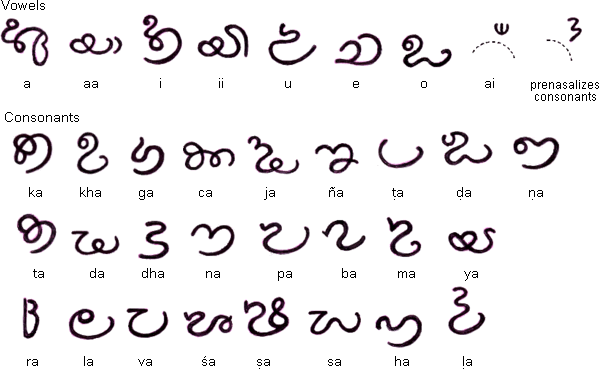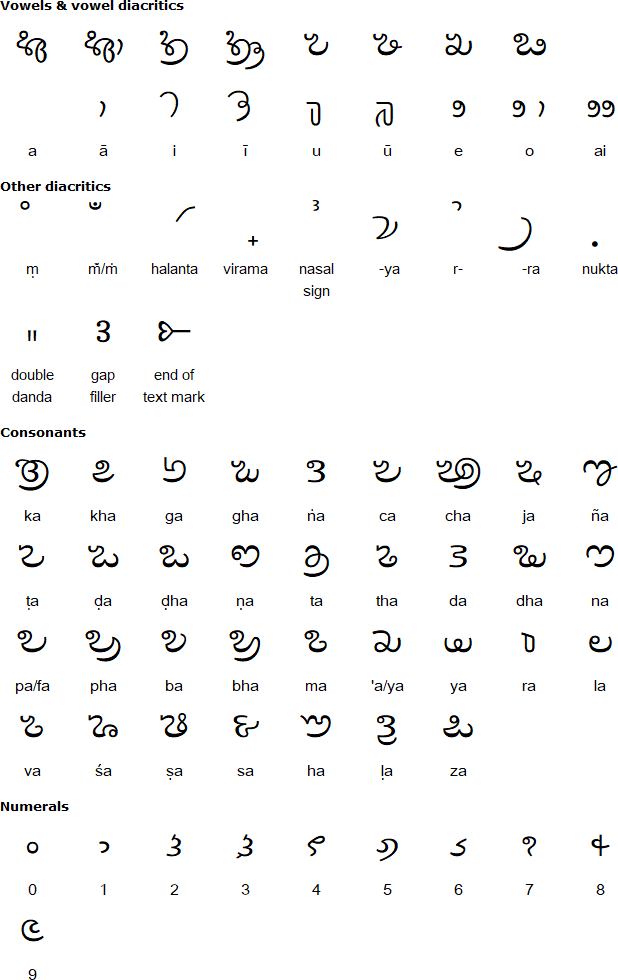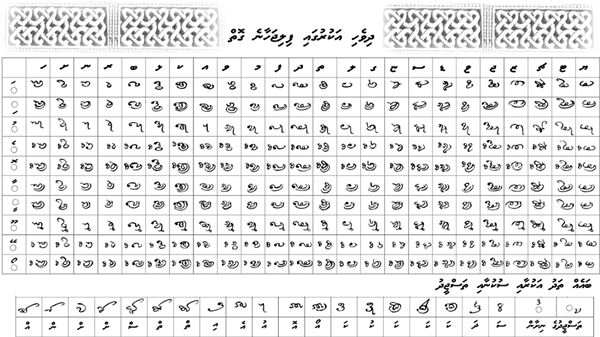The Dives Akuru script was used in the Maldive Islands. It developed from the Grantha script and the earliest known inscription, found on Landhū Island in Southern Miladhunmadulhu Atoll, dates back to the 8th century AD. The script is thought to have been in use before then, however evidence of this has yet to be found.
The early Madivian scripts were divided into two variants, Dives Akuru, "island letters", and Evēla Akuru, "ancient letters", by H. C. P. Bell, who studied the Maldivian linguistics after retiring from the British colonial service in Ceylon (Sri Lanka) in the early 20th century.
Dives Akuru developed from Evēla Akuru and was used mainly on tombstones, grants and on some monuments until about the 18th century, when it was replaced by the Thaana script. However in some of the southern Maldive islands, Dives Akuru continued to be used until the early 20th century. Today only scholars and hobbyists stil use the script.
Dives Akuru is also known as Dhives Akuru, Divehi Akuru (𑤝𑤱𑤩𑤴𑤭𑤱 𑤥𑤌𑤳𑤧𑤳) or Dhivehi Akuru.


Download a script chart for Dives Akuru and other Maldivian scripts (Excel)

See a larger version of this image

Information about Evēla Akuru and Dives Akuru
https://en.wikipedia.org/wiki/Maldivian_writing_systems
http://en.wikipedia.org/wiki/Dhives_Akuru
https://symbl.cc/en/unicode/blocks/dives-akuru/
https://www.unicode.org/L2/L2018/18016r-dives-akuru.pdf
Ahom, Aima, Arleng, Badagu, Badlit, Basahan, Balinese, Balti-A, Balti-B, Batak, Baybayin, Bengali, Bhaiksuki, Bhujimol, Bilang-bilang, Bima, Blackfoot, Brahmi, Buhid, Burmese, Carrier, Chakma, Cham, Cree, Dehong Dai, Devanagari, Dham Lipi, Dhankari / Sirmauri, Ditema, Dives Akuru, Dogra, Ethiopic, Evēla Akuru, Fox, Fraser, Gond, Goykanadi, Grantha, Gujarati, Gunjala Gondi, Gupta, Gurmukhi, Halbi Lipi, Hanifi, Hanuno'o, Hočąk, Ibalnan, Incung, Inuktitut, Jaunsari Takri, Javanese, Kaithi, Kadamba, Kamarupi, Kannada, Kawi, Kharosthi, Khema, Khe Prih, Khmer, Khojki, Khudabadi, Kirat Rai, Kōchi, Kodava Lipi, Komering, Kulitan, Kurukh Banna, Lampung, Lanna, Lao, Lepcha, Limbu, Lontara/Makasar, Lota Ende, Magar Akkha, Mahajani, Malayalam, Meitei (Modern), Manpuri (Old), Marchen, Meetei Yelhou Mayek, Meroïtic, Masarm Gondi, Modi, Mon, Mongolian Horizontal Square Script, Multani, Nandinagari, Newa, New Tai Lue, Ojibwe, Odia, Ogan, Pahawh Hmong, Pallava, Phags-pa, Purva Licchavi, Qiang / Rma, Ranjana, Rejang (Kaganga), Sasak, Savara, Satera Jontal, Shan, Sharda, Sheek Bakrii Saphaloo, Siddham, Sinhala, Sorang Sompeng, Sourashtra, Soyombo, Sukhothai, Sundanese, Syloti Nagri, Tagbanwa, Tai Noi, Takri, Tamil, Tanchangya (Ka-Pat), Tani, Thaana, Telugu, Thai, Tibetan, Tigalari, Tikamuli, Tocharian, Tolong Siki, Vatteluttu, Warang Citi
Page last modified: 13.04.23
[top]
You can support this site by Buying Me A Coffee, and if you like what you see on this page, you can use the buttons below to share it with people you know.

If you like this site and find it useful, you can support it by making a donation via PayPal or Patreon, or by contributing in other ways. Omniglot is how I make my living.
Note: all links on this site to Amazon.com, Amazon.co.uk
and Amazon.fr
are affiliate links. This means I earn a commission if you click on any of them and buy something. So by clicking on these links you can help to support this site.
[top]